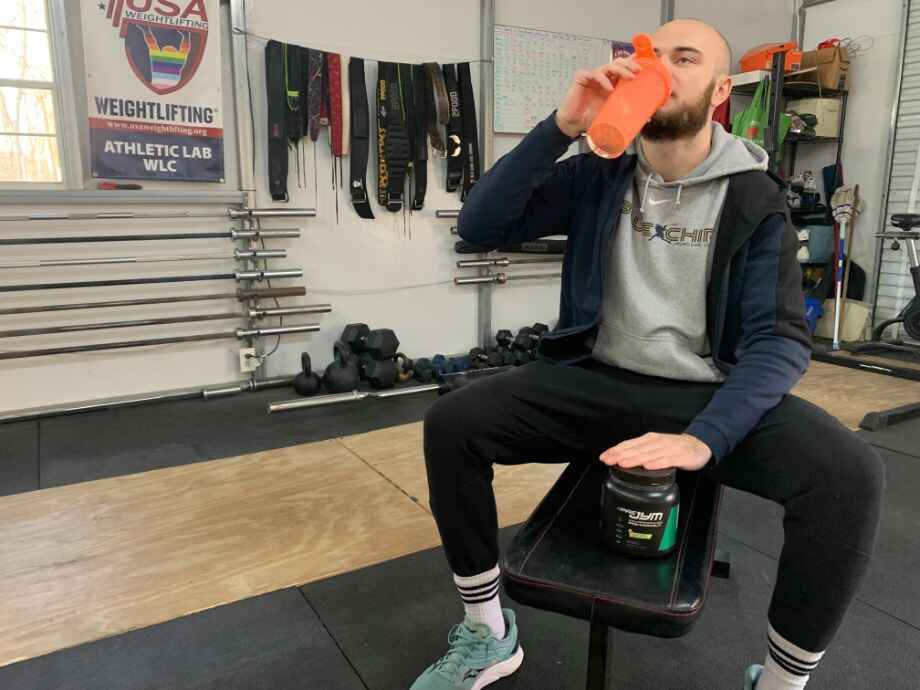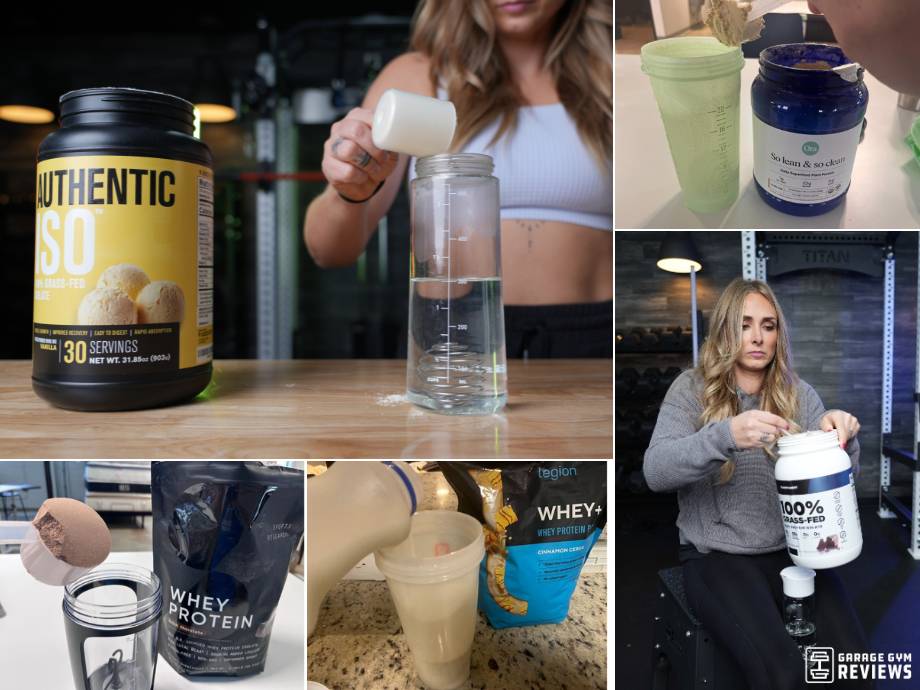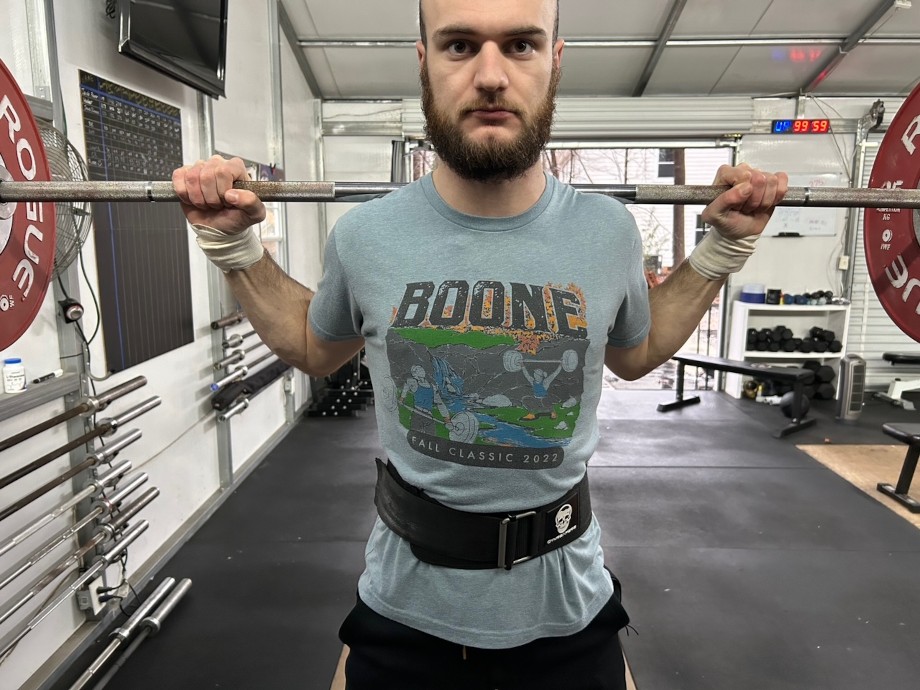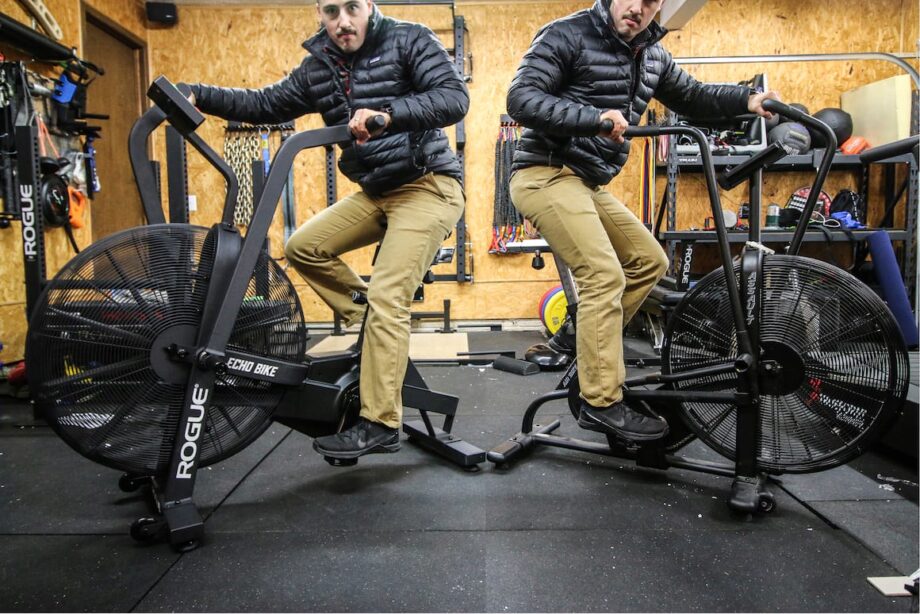Here at Garage Gym Reviews, we love all things fitness—especially a good pre-workout supplement. Whether you’re tired after a long week, you woke up extra early to squeeze in the gym before you head to work, or you’re feeling a little sluggish, a pre-workout can give you a nice pep in your step and help you power through a workout. Do regular gym-goers need one? Absolutely not. But, taking one of the best pre-workouts—correctly and at the right time—can provide lots of benefits.
In this article, I’ll explain the ins and outs of pre-workout timing so you’ll know when to take pre-workout as you work toward your fitness goals.
Medical disclaimer: This article is intended for educational and informational purposes only. It is not intended as a substitute for medical advice. For health advice, contact a licensed healthcare provider.
What Is a Pre-Workout?
Pre-workout supplements are formulas designed to improve your performance in the gym. They’re an ergogenic aid (or performance enhancer) that typically works by giving you more energy, improved focus, improved blood flow, or delayed muscular fatigue.
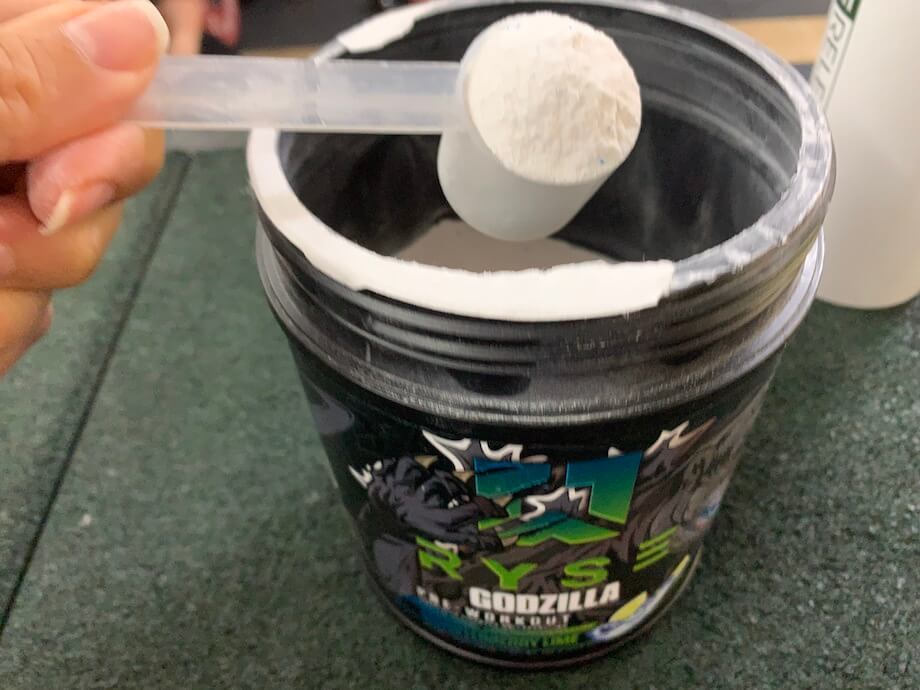
With these benefits, there’s a good chance you’re going to have a better workout than you would have otherwise. If you’re struggling to finish all of your sets and reps during your workout, a pre-workout may give you the push to finish.
RELATED: Best Cheap Pre-Workout
When To Take Pre-Workout
When it comes to pre-workout powder timing, there are a few factors to consider, and you’ll need to do some individual testing. Some people metabolize caffeine slower than others and need to take a pre-workout at least 60 minutes before training, while others feel the caffeine kick in much faster and may be able to take a pre-workout 15 to 20 minutes before a workout.
Food also plays a role, as pre-workouts taken on an empty stomach will likely hit much faster.
It may take some testing to see what feels best for you based on when you workout, and when your last meal was. If you’re crashing midway through your workout, you’ve taken your pre-workout too soon, and if you don’t feel it kick in until you’re already done with your training, you may need to take it earlier.

One important thing to note is that caffeine can remain active in your body and disrupt sleep for quite some time, even if you don’t “feel” the effects. The average half-life of caffeine is around five hours1, which means if you consume 200 milligrams of caffeine, you’ll still have 100 milligrams in your body after five hours.
If you notice you’re having trouble falling asleep, try to avoid taking pre-workouts beyond the early afternoon, or consider using one of the best stimulant-free pre-workouts if you train in the evening.
How To Take Pre-Workout
In general, we recommend that you take your pre-workout as directed on the label about 30 to 60 minutes before your workout. You can also try taking a half dose at first as your system gets used to the energy jolt. The most popular way to take pre-workout is to mix it with about 16 ounces of water and drink it. Some lifters may also opt for mixing their creatine with pre-workout before training. Others prefer to take their pre-workout on an empty stomach to avoid the pre-workout effects from being diluted by food. There’s nothing inherently wrong with this, but it may cause digestive issues if you have a sensitive stomach.
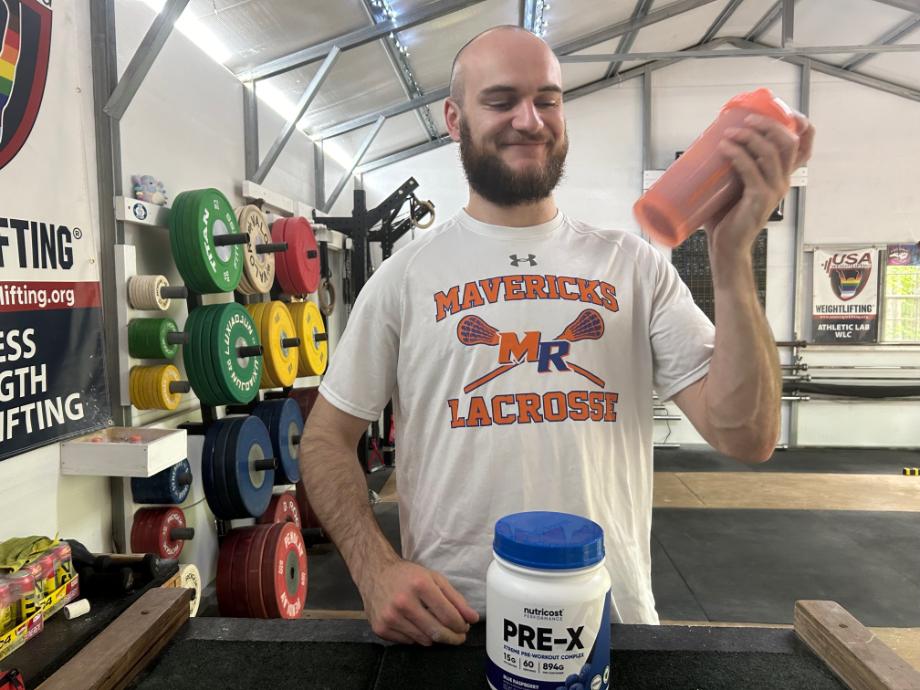
One method we strongly advise against is dry scooping pre-workout. The belief—as circulated by TikTok—is that taking your pre-workout dry will allow your body to absorb the ingredients even faster for better results. Not only is this inaccurate, but it can also lead to dangerous health risks. So, just don’t do it.
Benefits of Pre-Workout
The most common benefit of using a pre-workout is the energy from caffeine and any other stimulants that may be added. When you feel fatigued, a bit of extra energy can help you power through difficult workouts.
Aside from caffeine, many pre-workouts include ingredients that provide additional benefits like increased blood flow, decreased energy fatigue, improved mental focus, and increased hydration levels. Some pre-workouts are intentionally designed without stimulants, so you can use them at night.
Each pre-workout formula has different ingredients and can provide a variety of benefits, so you’ll need to check the ingredient list to figure out exactly which benefits you’re getting.
What’s in a Pre-Workout?
Pre-workout ingredients can vary greatly, as there are a near-endless number of options on the market. Here at GGR, we’ve personally tested 66 pre-workouts and counting, and you’ll rarely find two products with identical ingredients.
RELATED: Best Natural Pre-Workout

Here are some of the common ingredients to look for in a pre-workout product:
- Caffeine: Caffeine is one of the most well-known stimulants, and can improve energy levels and sports performance2. This is usually the primary ingredient in stimulant-based pre-workouts.
- Beta-alanine: Beta-alanine is the ingredient that makes you feel itchy and tingly after taking a pre-workout—a harmless sensation called paresthesia—and will build up in your body over time. It can also help improve endurance and delay muscle fatigue3.
- Creatine: Creatine monohydrate is typically used to improve strength and power during high-intensity exercise, with the goal of increasing strength and muscle mass over time. There are plenty of pre-workout formulas with creatine, so you don’t have to purchase it separately.
- L-citrulline: L-citrulline is often added to pre-workouts because it can increase the production of nitric oxide,a compound that relaxes blood vessels to improve blood flow4 during training. This is usually the “pump” ingredient in pre-workouts, especially those marketed toward bodybuilding goals.
- L-theanine: L-theanine is often paired with caffeine to help improve cognitive function5, and when combined with caffeine, it’s been shown to blunt some of the potential negative side effects of caffeine6, improving sleep and decreasing the jittery, stressed feeling caffeine can cause.
- Betaine: Betaine is a natural ingredient primarily found in beetroot. While its impact on exercise has shown mixed results, a 2023 study7 found that betaine did improve CrossFit performance6 and may help with endurance during particularly intense workouts.
- BCAAs: BCAAs, or branched-chain amino acids, are three essential amino acids found in most complete protein sources (leucine, valine, and isoleucine). They’re often included in pre-workouts to promote muscle growth and aid recovery; however, studies have shown8 that BCAAs alone aren’t enough to stimulate muscle growth, as you need all nine of the essential amino acids.
- Electrolytes: Electrolytes are essential minerals lost while sweating, and they’re often included in pre-workouts to increase hydration. The most common electrolytes—sodium, potassium, and magnesium—are present in many pre-workout supplements, as well as popular sports drinks.
RELATED: Best Electrolyte Drinks
What To Look For in a Pre-Workout
With so many options, it’s important to understand what to look for in a pre-workout so you can choose a high-quality formula.
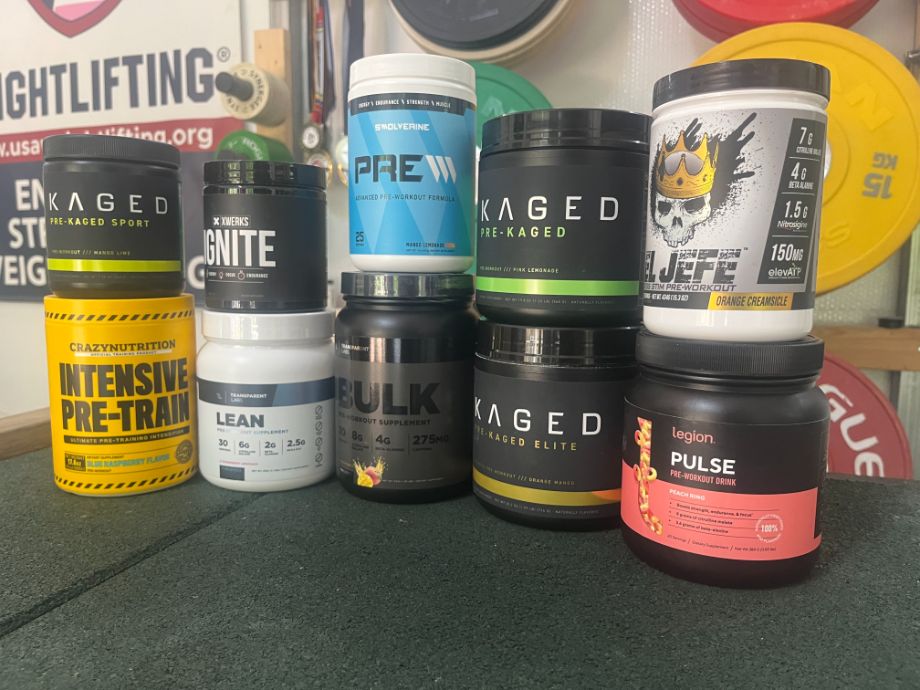
Here are some of the most important things to check the next time you’re considering a pre-workout.
- Caffeine dosage: According to the FDA9, adults can safely consume up to 400 milligrams of caffeine daily. For reference, a typical cup of coffee has around 95 milligrams of caffeine. If you’re not as sensitive to caffeine and want a stronger option, check out our guide to the strongest pre-workouts.
- Other stimulants: Be sure to look for other forms of stimulants, like green tea extract, yohimbine, B vitamins, or other forms of caffeine. If you see multiple stimulants, add up the total dosing, not just the caffeine.
- Label accuracy: Any good dietary supplement will tell you exactly how much of each ingredient is in the product. If you see a proprietary blend, that means the manufacturer doesn’t want to disclose how much of each ingredient they’re including, which can be a red flag.
- Third-party testing: Whenever possible, try to find a supplement that’s third-party tested, which can help ensure you’re getting a pure product with accurate dosing.
How Long Does Pre-Workout Take to Kick In?
The time it takes for you to feel the energy boost from your pre-workout can depend on a few factors. On average, caffeine typically kicks in around the 45- to 60-minute mark, but other factors make it impossible to give a blanket answer when asked how long it takes for pre-workout to kick in.
The first factor is caffeine metabolism. A recent study10 found that some people metabolize caffeine and feel the benefits very quickly, while others metabolize caffeine more slowly. If you’re a fast metabolizer, you can take your pre-workout closer to your training session than a slow metabolizer can.

Not sure which kind you are? Pay attention to how long it takes you to feel the effects of your pre-workout next time you take some. You’ll be able to use this time to calculate your ideal pre-workout schedule.
Once you know what kind of caffeine metabolizer you are, you must also pay attention to your food. If you take a pre-workout on an empty stomach, you’ll likely feel the effects faster than if you’ve just eaten, as a full stomach can slow digestion.
The levels of caffeine you’re consuming also matter, as a product with more caffeine will likely kick in a bit faster.
Do Pre-Workouts Have Any Side Effects?
Yes, any type of supplement can cause side effects, especially ones that may contain high doses of stimulants. You may experience increased blood pressure, headaches, insomnia, jitters, and more.
Perry Nix, MS, RD, LD, says: “Pre-workouts might make you feel great in the gym, but they can result in uncomfortable side effects. To avoid these, be sure to stick to the recommended serving size on the product label, and drink plenty of water.”
To read more about the possible side effects, check out Perry’s article covering the various pre-workout side effects.
When to Take Pre-Workout: Final Thoughts
While I wish I could give one answer that applies to everyone, you really need to do some testing to figure out the best timing for your preferences. Taking a pre-workout too early could leave you crashing before the end of your workout, and if you take it too late, you’ll be wired and jittery on the drive home instead of focusing that energy on your training.
- How quickly you feel a pre-workout depends on your body composition, but many people take their pre-workout 20 to 30 minutes before training.
- Taking pre-workout on a full stomach will slow digestion and absorption.
- If you’re going to use pre-workouts at night, consider a stim-free option to avoid sleep disruptions.
When to Take Pre-Workout: FAQs
What time is too late for pre-workout?
With a five-hour half-life, it’s best to avoid taking caffeine past the early afternoon. Any amount of caffeine can disrupt your sleep, and you want to give your body time to eliminate as much caffeine as possible before bedtime. One study found that using L-theanine may improve sleep in the presence of caffeine5, but I wouldn’t count on that to completely blunt the caffeine.
How long does pre-workout take to kick in?
On average, it can take pre-workout anywhere from 30 minutes to an hour to kick in.
Why do you have to wait 30 minutes after taking pre-workout?
It takes roughly 30 minutes to an hour—depending on your metabolism—for the caffeine in your pre-workout to “kick in.” Of course, you don’t have to wait, some lifters choose to take their pre-workout around 30 minutes before training to take advantage of the caffeine boost when it’s at its peak.
These statements have not been evaluated by the Food and Drug Administration. This product is not intended to diagnose, treat, cure, or prevent any diseases
References
- Institute of Medicine (US) Committee on Military Nutrition Research. Caffeine for the Sustainment of Mental Task Performance: Formulations for Military Operations. Washington (DC): National Academies Press (US); 2001. 2, Pharmacology of Caffeine. Available from: https://www.ncbi.nlm.nih.gov/books/NBK223808/
- Guest NS, VanDusseldorp TA, Nelson MT, et al. International society of sports nutrition position stand: caffeine and exercise performance. J Int Soc Sports Nutr. 2021;18(1):1. Published 2021 Jan 2. doi:10.1186/s12970-020-00383-4
- Trexler ET, Smith-Ryan AE, Stout JR, et al. International society of sports nutrition position stand: Beta-Alanine. J Int Soc Sports Nutr. 2015;12:30. Published 2015 Jul 15. doi:10.1186/s12970-015-0090-y
- Gonzalez AM, Yang Y, Mangine GT, Pinzone AG, Ghigiarelli JJ, Sell KM. Acute Effect of L-Citrulline Supplementation on Resistance Exercise Performance and Muscle Oxygenation in Recreationally Resistance Trained Men and Women. J Funct Morphol Kinesiol. 2023;8(3):88. Published 2023 Jun 22. doi:10.3390/jfmk8030088
- Owen GN, Parnell H, De Bruin EA, Rycroft JA. The combined effects of L-theanine and caffeine on cognitive performance and mood. Nutr Neurosci. 2008;11(4):193-198. doi:10.1179/147683008X301513
- Baba Y, Takihara T, Okamura N. Theanine maintains sleep quality in healthy young women by suppressing the increase in caffeine-induced wakefulness after sleep onset. Food Funct. 2023;14(15):7109-7116. Published 2023 Jul 31. doi:10.1039/d3fo01247f
- Zawieja E, Durkalec-Michalski K, Sadowski M, Główka N, Chmurzynska A. Betaine supplementation improves CrossFit performance and increases testosterone levels, but has no influence on Wingate power: randomized crossover trial. J Int Soc Sports Nutr. 2023;20(1):2231411. doi:10.1080/15502783.2023.2231411
- Plotkin DL, Delcastillo K, Van Every DW, Tipton KD, Aragon AA, Schoenfeld BJ. Isolated Leucine and Branched-Chain Amino Acid Supplementation for Enhancing Muscular Strength and Hypertrophy: A Narrative Review. Int J Sport Nutr Exerc Metab. 2021;31(3):292-301. doi:10.1123/ijsnem.2020-0356
- Commissioner O of the. Spilling the Beans: How Much Caffeine is Too Much? FDA. Published online September 6, 2023. Accessed December 22, 2023. https://www.fda.gov/consumers/consumer-updates/spilling-beans-how-much-caffeine-too-much#:~:text=For%20healthy%20adults%2
- Barreto G, Esteves GP, Marticorena F, Oliveira TN, Grgic J, Saunders B. Caffeine, CYP1A2 Genotype and Exercise Performance: A Systematic Review and Meta-analysis. Med Sci Sports Exerc. Published online October 12, 2023. doi:10.1249/MSS.0000000000003313


